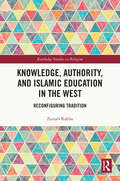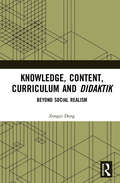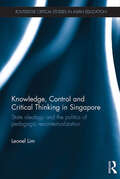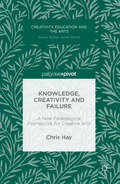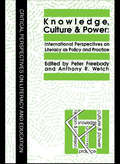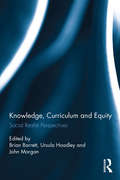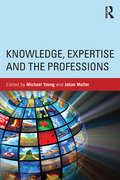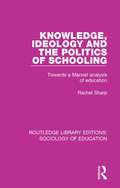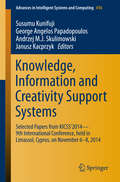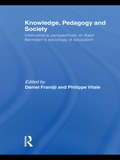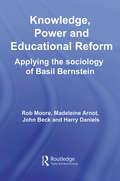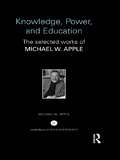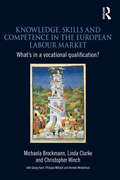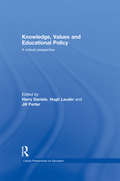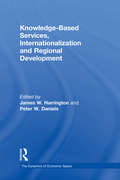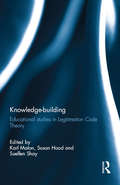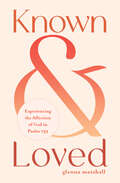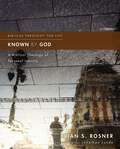- Table View
- List View
Knowledge, Authority, and Islamic Education in the West: Reconfiguring Tradition (Routledge Studies in Religion)
by Zainab KabbaDrawing on immersive fieldwork in the United States, Canada, and Turkey, this ethnographic exploration illuminates the transformative experiences of emerging adult Muslims on their quest for religious knowledge. This book unravels the significance of four residential learning settings, revealing their role as catalysts for reshaping Islamic tradition. Delving into the interplay between technology’s pervasive influence and the decentralized nature of Islamic interpretation, Zainab Kabba unveils a vibrant tapestry of knowledge producers vying to shape religious understanding and practice among Western Muslims. At the heart of this narrative lies the delicate balance between teachers and students, continuously communicating and recalibrating components that bring religious authority to life. Kabba dissects this relationship, highlighting the emergence of a complex landscape that she terms the ‘Muslim Education Industrial Complex’, where religious knowledge has become a commodity. This study offers profound insights into the challenges of intra-Muslim dialogue and the adaptive resilience of American Sunni-Muslim communities. Amidst a digital age and the complexities of global geopolitics surrounding Islam, it showcases how these communities reinterpret classical Islamic narratives, navigating tradition to steer their path forward. This book invites readers to ponder the evolution of Islamic learning, the dynamics of authority, and the enduring quest for knowledge amidst the currents of a rapidly changing world.
Knowledge, Content, Curriculum and Didaktik: Beyond Social Realism
by Zongyi DengBringing to bear a wealth of literature from curriculum theory, Didaktik, philosophy of education and teacher education, this book broadens and enriches the conversation initiated by Michael Young and his colleagues on 'bringing knowledge back in' (Young, 2007). Knowledge, Content, Curriculum and Didaktik is distinctive in providing a comprehensive and multifaceted analysis of the role of knowledge, and in particular curriculum content, in relation to curriculum policy, curriculum planning and classroom teaching. It makes a case for linking knowledge and content to the development of human powers or capabilities needed for the 21st century and unpacks the challenges for curriculum policy, curriculum planning and classroom teaching. The book discusses, among other issues: Educational aims and theories of knowledge School subjects and academic disciplines: differences and relationships School subjects and theories of content Understanding the content for teaching The book will be relevant for scholars, researchers, policy makers and curriculum developers who seek a more sophisticated, more balanced and philosophically better grounded understanding of the role of knowledge and content in education and curriculum.
Knowledge, Control and Critical Thinking in Singapore: State ideology and the politics of pedagogic recontextualization (Routledge Critical Studies in Asian Education)
by Leonel LimThis book examines how critical thinking is regulated in Singapore through the process of what the influential sociologist of education Basil Bernstein termed "pedagogic recontextualization". The ability of critical thinking to speak to alternative possibilities and individual autonomy as well as its assumptions of a liberal arrangement of society is problematized in Singapore’s socio-political climate. By examining how such curricular discourses are taken up and enacted in the classrooms of two schools that cater to very different groups in society, the book foregrounds the role of traditional high-status knowledge in the elaboration of class formation and develops a critical understanding of post-developmental state initiatives linked to the parable of modernization in Singapore. Knowledge, Control and Critical Thinking in Singapore offers chapters on:• Critical Thinking and the Singapore State: Meritocracy, Illiberalism and Neoliberalism • Sacred Knowledge and Elite Dispositions: Recontextualizing Critical Thinking in an Elite School• Power, Knowledge and Symbolic Control: Official Pedagogic Identities and the Politics of Recontextualization This book will appeal to scholars in comparative education studies, curriculum studies and education reform. It will also interest scholars engaged in Asian studies who are struggling to understand issues of education policy formation and implementation, particularly in the areas of critical thinking and other knowledge skills.
Knowledge, Creativity and Failure
by Chris HayThis book offers a new framework for the analysis of teaching and learning in the creative arts. It provides teachers with a vocabulary to describe what they teach and how they do this within the creative arts. Teaching and learning in this field, with its focus on the personal characteristics of the student and its insistence on intangible qualities like talent and creativity, has long resisted traditional models of pedagogy. In the brave new world of high-stakes assessment and examination-driven outcomes across the education system, this resistance has proven to be a severe weakness and driven creative arts teachers further into the margins. Instead of accepting this relegation teachers of creative arts must set out to capture the distinctiveness of their pedagogy. This book will allow teachers to transcend the opaque metaphors that proliferate in the creative arts, and instead to argue for the robustness and rigour of their practice.
Knowledge, Culture And Power: International Perspectives On Literacy As Policy And Practice (Critical Perspectives On Literacy And Education Ser. #Vol. 6)
by Peter Freebody Anthony R. WelchFirst published in 1992. Routledge is an imprint of Taylor & Francis, an informa company.
Knowledge, Curriculum and Equity: Social Realist Perspectives
by John Morgan Brian Barrett Ursula HoadleyIn 2008 the first in a series of symposia established a ‘social realist’ case for ‘knowledge’ as an alternative to the relativist tendencies of the constructivist, post-structuralist and postmodernist approaches dominant in the sociology of education. The second symposium focused on curriculum, and the development of a theoretical language grounded in social realism to talk about issues of knowledge and curriculum. Finally, the third symposium brought together researchers in a broad range of contexts to build on these ideas and arguments and, with a concerted empirical focus, bring these social realist ideas and arguments into conversation with data. Knowledge, Curriculum and Equity: Social Realist Perspectives contains the work of the third symposium, where the strengths and gaps in the social realist approach are identified and where there is critical recognition of the need to incrementally extend the theories through empirical study. Fundamentally, the problem that social realism is seeking to address is about understanding the social conditions of knowledge production and exchange as well as its structuring in the curriculum and in pedagogy. The central concern is with the on-going social reproduction of inequality through schooling, and exploring whether and how foregrounding specialised knowledge and its access holds the possibility for interrupting it. This book consists of 13 chapters by different authors working in Oceania, Asia, Europe, Africa and North America. From very different vantage points the authors focus their theoretical and empirical sights on the assumptions about knowledge that underpin educational processes and the pursuit of more equitable schooling for all.
Knowledge, Expertise and the Professions
by Michael Young Johan MullerIt has long been recognised that specialised knowledge is at the core of what distinguishes professions from other occupations. The privileged status of professions in most countries, however, together with their claims to autonomy and access to specialised knowledge, is being increasingly challenged both by market pressures and by new instruments of accountability and regulation. Established and emerging professions are increasingly seen as either the solution, or as sources of conservatism and resistance to change in western economies, and recent developments in professional education draw on a competence model which emphasises what newly qualified members of a profession ‘can do’ rather than what ‘they know’. This book applies the disciplines of the sociology of knowledge and epistemology to the question of professional knowledge. What is this knowledge? It goes beyond traditional debates between ‘knowing how’ and ’knowing that’, and ‘theory’ and ‘practice’. The chapters cover a wide range of issues, from discussions of the threats to the knowledge base of established professions including engineers and architects, to the fraught situations faced by occupations whose fragile knowledge base and professional status is increasingly challenged by new forms of control. While recognising that graduates seeking employment as members of a profession need to show their capabilities, the book argues for reversing the trend that blurs or collapses the skill/knowledge distinction. If professions are to have a future then specialised knowledge is going to be more important than ever before. Knowledge, Expertise and the Professions will be key reading for students, researchers and academics in the fields of professional expertise, further education, higher education, the sociology of education, and the sociology of the professions.
Knowledge, Ideology and the Politics of Schooling: Towards a Marxist analysis of education (Routledge Library Editions: Sociology of Education #50)
by Rachel SharpFirst published in 1980, this book argues that a theory of ideology is essential to a theory of education. It relates developments in the Marxist theory of ideology to the analysis of schooling in a capitalist society. Beginning with an appraisal of the early twentieth century liberal social theorists, including Weber, Durkheim, Veblen and Mannheim, it demonstrates that the weakness of their approaches arose from a failure to comprehend adequately the nature of capitalism. It then outlines the state of the theory of ideology at the time and applies the concept in an analysis of contemporary schooling, concluding with a discussion of its political implications. The application of the theory of ideology offers important possibilities for a radical socialist strategy on education.
Knowledge, Information and Creativity Support Systems
by George Angelos Papadopoulos Janusz Kacprzyk Susumu Kunifuji Andrzej M. J. SkulimowskiThisvolume consists of a number of selected papers thatwere presented at the 9th International Conference on Knowledge, Informationand Creativity Support Systems (KICSS 2014) in Limassol, Cyprus, after theywere substantially revised and extended. The 26 regularpapers and 19 short papers included in this proceedings cover all aspects ofknowledge management, knowledge engineering, intelligent information systems,and creativity in an information technology context, including computationalcreativity and its cognitive and collaborative aspects.
Knowledge, Pedagogy and Society: International Perspectives on Basil Bernstein's Sociology of Education
by Daniel FrandjiOver the course of the late-twentieth century Basil Bernstein pioneered an original approach to educational phenomena, taking seriously questions regarding the transmission, distribution and transformation of knowledge as no other before had done. Arguing tirelessly for change, more than any other British sociologist it is Bernstein who presents to us education as a social right and not as a privilege. It is this objective today that makes his work so important. Knowledge, Pedagogy and Society seeks to clarify the broad brushstrokes of his theories, developed over the span of more than forty years, by collecting together scholars from every corner of the globe; specialists in education, sociology and epistemology to test and examine Bernstein’s work against the backdrop of their own research. From teaching content and the social, cognitive and linguistic aspects of education, to changes in the political climate in the early twenty-first century, this collection represents an open dialogue with Bernstein’s work using a forward-looking and dynamic approach. Originally published in French with the explicit aim of locating Basil Bernstein’s theories alongside those of Pierre Bourdieu, one of the most important European sociologists, the French editors draw together a collection that offers a diverse background and perspective on Bernstein’s work and thought. Revised to include a new preface, a new introduction and revisited papers, the English edition will be a relevant resource for anyone interested in Bernstein, his reception and importance, as well as individuals working in the sociology of education, theory of education and education policy.
Knowledge, Pedagogy, and Postmulticulturalism
by Gay WilgusThis volume identifies, problematizes, and discusses issues specific to the design of educational programs for teacher candidates from working class, ethnic- and language-minority, and immigrant backgrounds, taking as its starting point the distinctive, complex perspectives that these candidates bring to the university classroom.
Knowledge, Power and Educational Reform: Applying the Sociology of Basil Bernstein
by John Beck Harry Daniels Madeleine Arnot Rob MooreThis book is made up of a selection of writings from an international team of scholars, highlighting the contribution made to the field of educational policy and educational policy research by Basil Bernstein's work on the sociology of pedagogy. These contributors explore, analyse and engage with contemporary political reforms of education, contemporary pedagogic debates and the changing nature of professional knowledge, relationships and structures. The subjects covered include: particular concepts such as voice research the significance of social class in relation to the language, schooling and home cultures differences between official and pedagogic recontextualising fields formation of different types of identities the construction of the learner formation of teacher identities and use of pedagogic discourses analysis of performance-based educational reforms and its impact on pedagogy.
Knowledge, Power, and Academic Freedom (The Wellek Library Lectures)
by Joan Wallach ScottAcademic freedom rests on a shared belief that the production of knowledge advances the common good. In an era of education budget cuts, wealthy donors intervening in university decisions, and right-wing groups threatening dissenters, scholars cannot expect that those in power will value their work. Can academic freedom survive in this environment—and must we rearticulate what academic freedom is in order to defend it?This book presents a series of essays by the renowned historian Joan Wallach Scott that explore the history and theory of free inquiry and its value today. Scott considers the contradictions in the concept of academic freedom. She examines the relationship between state power and higher education; the differences between the First Amendment right of free speech and the guarantee of academic freedom; and, in response to recent campus controversies, the politics of civility. The book concludes with an interview conducted by Bill Moyers in which Scott discusses the personal experiences that have informed her views. Academic freedom is an aspiration, Scott holds: its implementation always falls short of its promise, but it is essential as an ideal of ethical practice. Knowledge, Power, and Academic Freedom is both a nuanced reflection on the tensions within a cherished concept and a strong defense of the importance of critical scholarship to safeguard democracy against the anti-intellectualism of figures from Joseph McCarthy to Donald Trump.
Knowledge, Power, and Education: The Selected Works of Michael W. Apple
by Michael W. AppleFor more than three decades, Michael W. Apple has sought to uncover and articulate the connections among knowledge, teaching, and power in education. His germinal Ideology and Curriculum was a watershed title in critical education studies, and has remained in print since its publication in 1979. The more than two dozen books and hundreds of papers, articles, and chapters published since have likewise all contributed to a greater understanding of the relationship between and among the economy, political, and cultural power in society on the one hand "and the ways in which education is thought about, organized, and evaluated" on the other. In this collection, Apple brings together 13 of his key writings in one place, providing an overview not just of his own career, but of the larger development of the field. A new introduction re- examines the scope of his work and his earlier arguments, and reflects on what remains to be done for those committed to critical education.
Knowledge, Skills and Competence in the European Labour Market: What’s in a Vocational Qualification?
by Christopher Winch Linda Clarke Michaela BrockmannFor the free movement of labour across the European Union, establishing transparency and comparability of qualifications across member states is vital. This book examines how qualifications, knowledge, skills and competences are understood in different national contexts and trans-nationally and reveals a complex picture of differences and similarities both within and between countries. Against the background of EU policy initiatives, and in particular the European Qualifications Framework, an important focus is on the prospects and difficulties of establishing cross-national recognition of qualifications. Drawing on case studies of particular sectors and occupations in England, France, Germany and the Netherlands, this insightful book, written by leading academics in the field, will be a vital resource for students and researchers involved with vocational education and training, continuing professional development, human resource management and European Union policy.
Knowledge, Values and Educational Policy: A Critical Perspective (Critical Perspectives On Education Ser.)
by Harry Daniels Hugh Lauder Jill PorterKnowledge, Values and Educational Policy focuses on what schools are for and what should be taught in them, how learning is possible across boundaries, and issues of diversity and equity. Policies and practices relating to schools are also considered. Within this volume, internationally renowned contributors address a number of fundamental questions designed to take the reader to the heart of current debates around curriculum, knowledge transfer, equity and social justice, and system reform, such as: What are schools and what are they for? What knowledge should schools teach? How are learners different from each other and how are groups of learners different from one another, in terms of social class, gender, ethnicity, and disability? What influence does educational policy have on improving schools? What influence does research have on our understanding of education and schooling? To encourage reflection, many of the chapters also include questions for debate and a guide to further reading. Read alongside its companion volume, Educational Theories, Cultures and Learning, readers will be encouraged to consider and think about on some of the key issues facing education and educationists today.
Knowledge-Based Services, Internationalization and Regional Development (The Dynamics of Economic Space)
by Peter DanielsThe acquisition and management of information is central to the operation and marketing of many service-providing firms and other organizations. Their varied knowledge requirements influence approaches to organizational structure, relationships to other organizations, the location of operations, and entry into new markets. In this book, an international and interdisciplinary team of leading scholars examines the attributes of knowledge acquisition and diffusion within and across service-providing organizations. Using a variety of case examples, they pay particular attention to the processes of internationalization and the ways in which service-providing organizations affect regional economic development.
Knowledge-building: Educational studies in Legitimation Code Theory (Legitimation Code Theory)
by Susan Hood Karl Maton Suellen ShayEducation and knowledge have never been more important to society, yet research is segmented by approach, methodology or topic. Legitimation Code Theory or ‘LCT’ extends and integrates insights from Pierre Bourdieu and Basil Bernstein to offer a framework for research and practice that overcomes segmentalism. This book shows how LCT can be used to build knowledge about education and society. Comprising original papers by an international and multidisciplinary group of scholars, Knowledge-building offers the first primer in this fast-growing approach. Through case studies of major research projects, Part I provides practical insights into how LCT can be used to build knowledge by: - enabling dialogue between theory and data in qualitative research - bringing together quantitative and qualitative methodologies in mixed-methods research - relating theory and practice in praxis - conducting interdisciplinary studies with systemic functional linguistics Part II offers a series of studies of pressing issues facing knowledge-building in education and beyond, encompassing: - diverse subject areas, including physics, English, cultural studies, music, and design - educational sites: schooling, vocational education, and higher education - practices of research, curriculum, pedagogy and assessment - both education and informal learning contexts, such as museums and masonic lodges Carefully sequenced and interrelated, these chapters form a coherent collection that gives a unique insight into one of the most thought-provoking and innovative ways of building knowledge about knowledge-building in education and society to have emerged this century. This book is essential reading for all serious students and scholars of education, sociology and linguistics.
Known and Loved: Experiencing the Affection of God in Psalm 139
by Glenna MarshallFearfully and wonderfully made—some truths transform us, body and soul.We hear that God is love and that He loves us, but what does that mean? And can this truth sink into our hearts in such a way that we are changed?In Known and Loved, Glenna Marshall reflects on Psalm 139, exploring the transformational truth that we are fully known and loved by the Triune God of the universe. This book, overflowing with truth and encouragement, combats the myths and lies that we are unlovable, alone, or unseen. God sets His love on us in spite of our failings and even when we feel unlovable.The psalmist tips our chins to fix our gaze on God who doesn&’t hold back His affections. Taking readers verse by verse Glenna shows how you are … known to the core, known body and soul, known in the dark and in your suffering, known when you want to run or give up, known in your fears and when you feel alone.We can be certain of God&’s steadfast love. Immerse yourself in Psalm 139—a transformational journey into the heart of God for you.
Known by God: A Biblical Theology of Personal Identity (Biblical Theology for Life)
by Jonathan Lunde Brian S. RosnerWho are you? What defines you? What makes you, you?In the past an individual's identity was more predictable than it is today. Life's big questions were basically settled before you were born: where you'd live, what you'd do, the type of person you'd marry, your basic beliefs, and so on. Today personal identity is a do-it-yourself project. Constructing a stable and satisfying sense of self is hard amidst relationship breakdowns, the pace of modern life, the rise of social media, multiple careers, social mobility, and so on. Ours is a day of identity angst.Known by God is built on the observation that humans are inherently social beings; we know who we are in relation to others and by being known by them. If one of the universal desires of the self is to be known by others, being known by God as his children meets our deepest and lifelong need for recognition and gives us a secure identity. Rosner argues that rather than knowing ourselves, being known by God is the key to personal identity.He explores three biblical angles on the question of personal identity: being made in the image of God, being known by God and being in Christ. The notion of sonship is at the center - God gives us our identity as a parent who knows his child. Being known by him as his child gives our fleeting lives significance, provokes in us needed humility, supplies cheering comfort when things go wrong, and offers clear moral direction for living.X
Known by Name: In the Face of Rejection, God Says I’m Significant (Known by Name)
by Nicole Johnson Karen Lee-Thorp Kasey Van Norman Jada EdwardsThe women in the Bible asked the same three questions we all still ask today: How does everyone else see me? How do I see myself? How does God see me?Hagar’s story, found in Genesis 16, is a story of cultural victimization. She was betrayed, abandoned, and scorned. Her response? She did what most of us would do when deeply hurt by someone we trust–she ran away. She got defensive. She retreated to a place where she felt safe. She felt justified in her anger and hurt. But deep in her core was a woman who longed to be seen and hoped for redemption.This Bible study will take you through Hagar’s story as she learns from hurt and heartache that what is unresolved is not unseen by God. The lack of finality in Hagar’s story teaches us to trust God with the ending–believing he sees us and he knows.This study guide features video notes, group discussion questions, and between-session activities like reflecting on the drama and teachings, studying the character story in Scripture, memory verses, and journaling.Sessions include:Exposing the Lie of ShameRejected to AcceptedTrusting after BetrayalTransformed and SeenDesigned for use with Known By Name: Hagar Video Study (9780310096498), sold separately.
Known by Name: When I Feel Worthless, God Says I’m Enough (Known by Name)
by Nicole Johnson Karen Lee-Thorp Kasey Van Norman Jada EdwardsThe women in the Bible asked the same three questions we all still ask today: How does everyone else see me? How do I see myself? How does God see me?Naomi’s story, found in the book of Ruth, is a story of lost identity. She lost her husband and her sons, which in her culture left her completely without a home or a means to support herself. She was a Hebrew woman in Moabite territory, alone among strangers. She reacted by letting her circumstances define her. But even in her angry, fearful, rather dramatic season of feeling like the victim, God kept showing his faithfulness.This Bible study will take you through Naomi’s journey from comfort and security to despair and bitterness; from hopeless drifting to faithful obedience; and from loss to redemption in one short lifetime. We’ll learn that when we go through trauma, loss, and hardship, it’s normal to feel Just. So. Done. Yet God remains close. He is not done. He can and will redeem even in our darkest circumstances.This study guide features video notes, group discussion questions, and between-session activities like reflecting on the drama and teachings, studying the character story in Scripture, memory verses, and journaling.Sessions include:When Hard Times HitBehind the ScenesBetter than Being FixedFrom Bitter to BlessedDesigned for use with Known By Name: Naomi Video Study (9780310096597), sold separately.
Knox Knocks: Hooray for Mail Day! (Highlights Puzzle Readers)
by Judy KatschkeHighlights Puzzle Readers offer an innovative approach to learning that integrates puzzles and stories to develop motivated, confident readers. These Level 2 books are perfect for kids starting to read longer and more complex sentences.Knox, a snail mail carrier, delivers packages with a smile--and a hilarious joke for each recipient. In this pun-filled Level 2 Highlights Puzzle Reader, readers must solve six mazes to help Knox deliver the mail on time for the Mail Day Parade. With bonus knock-knock jokes, Knox Knocks: Hooray for Mail Day! is perfect for beginning readers.
Knox Knocks: Special Delivery (Highlights Puzzle Readers)
by Judy KatschkeHighlights Puzzle Readers offer an innovative approach to learning that integrates puzzles and stories to develop motivated, confident readers. These Level 2 books are perfect for kids starting to read longer and more complex sentences.Knox, a snail mail carrier, delivers packages with a smile--and a hilarious joke for each recipient. In this pun-filled Level 2 Highlights Puzzle Reader, readers must solve six mazes to help Knox deliver the mail with time to spare so he can celebrate his birthday. With bonus knock-knock jokes, Knox Knocks: Special Delivery is perfect for beginning readers.
Knuffle Bunny Too: A Case of Mistaken Identity
by Mo WillemsTrixie hurries to school to show off her one-of-a-kind Knuffle Bunny. But an awful surprise awaits her; someone else has the same bunny! Filled with hilarious illustrations, this is a wonderfully true story that will have the whole family laughing.
